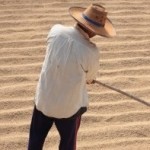 St. Francis de Sales uses earthly images to describe the faith process that leads to an ever growing love of God.
St. Francis de Sales uses earthly images to describe the faith process that leads to an ever growing love of God.
Certainly, faith leads to a growing love of God and love of God increases our devotion. That devotion can be expressed in many ways, as “devotions”; ie, verbal or vocal prayers, or as an intense awareness of the presence of God and subsequent clinging to His holy will.
Our love may grow immensely even while our knowledge of God in His essence remains limited. It is our faith and love that can grow more proportionately to the infinity of the Godhead.
St Francis de Sales supports these thoughts when he says in the Treatise on the Love of God, Book 6 Chapter 4, that in “this life we are able to have more love than knowledge of God: whence the great S. Thomas assures us, that oftentimes the most simple women abound in devotion, and are ordinarily more capable of heavenly love than clever and learned men. “
 He goes on to use the image of mining for precious metals as an endeavor we do somewhat “blindly”, thus we also grope with our faith toward God.
He goes on to use the image of mining for precious metals as an endeavor we do somewhat “blindly”, thus we also grope with our faith toward God.
“In holy love, inasmuch as our will is not applied to it by a natural knowledge, but by the light of faith, which assuring us of the infinite goodness that is in God, gives us sufficient cause to love him with all our force. We dig the earth to find gold and silver, employing a present labour for a good which as yet is only hoped for; so that an uncertain knowledge sets us upon a present and certain labour, and as we more discover the vein of the mineral, we search and search more earnestly.”
Our faith is imaged by clouds that obscure complete sight, yet we believe anyway.
 “Even a cold scent serves to move the hound to the game, so, dear Theotimus, a knowledge obscure and involved in clouds, like that of faith, most powerfully stirs our affection to love the goodness which it makes us perceive. O how true it is, according to S. Augustine’s exclamation, that the unlearned bear away heaven, while many of the wise are swallowed up in hell!”
“Even a cold scent serves to move the hound to the game, so, dear Theotimus, a knowledge obscure and involved in clouds, like that of faith, most powerfully stirs our affection to love the goodness which it makes us perceive. O how true it is, according to S. Augustine’s exclamation, that the unlearned bear away heaven, while many of the wise are swallowed up in hell!”
That faith leads to love is exampled by his interesting comparison of a blind man and a ploughman who both are aware of light.
 “In your opinion, Theotimus, which of the two would love the light more—the one born blind, who might know all the discourses that philosophers make of it and the praises they give it, or the ploughman, who by a clear sight feels and realizes the agreeable splendour of the fair rising sun? The first has more knowledge of it, but the second more fruition, and that fruition produces a love far more lively and affective than a simple knowledge by reasons; for the experience of good makes it infinitely more agreeable than all the science which can be had of it. We begin our love by the knowledge which faith gives us of God’s goodness, which afterwards we relish and taste by love; love whets our taste and our taste heightens our love, so that, as we see the waves, under the stress of winds, roll against one another and swell up, as if contact forced each to strive to outdo the rest, so the taste of good strengthens our love of it, and increases our relish for it, according to that oracle of the divine Wisdom: They that eat me, shall yet hunger: and they that drink me shall yet thirst.”
“In your opinion, Theotimus, which of the two would love the light more—the one born blind, who might know all the discourses that philosophers make of it and the praises they give it, or the ploughman, who by a clear sight feels and realizes the agreeable splendour of the fair rising sun? The first has more knowledge of it, but the second more fruition, and that fruition produces a love far more lively and affective than a simple knowledge by reasons; for the experience of good makes it infinitely more agreeable than all the science which can be had of it. We begin our love by the knowledge which faith gives us of God’s goodness, which afterwards we relish and taste by love; love whets our taste and our taste heightens our love, so that, as we see the waves, under the stress of winds, roll against one another and swell up, as if contact forced each to strive to outdo the rest, so the taste of good strengthens our love of it, and increases our relish for it, according to that oracle of the divine Wisdom: They that eat me, shall yet hunger: and they that drink me shall yet thirst.”
St. Francis de Sales does not deny that knowledge can also help us in our growing devotion to the Lord; it too has a part to play, accompanied by our faith. He alludes to the famous religious thinkers of his day and of the past, as St Augustine, Thomas Aquinas, St Bonaventure, to illustrate his point.
“We must admit, however, that the will, attracted by the delectation which it takes in its object, is much more forcibly drawn to unite itself therewith, when the understanding on its side excellently proposes the goodness thereof; for it is then at once both drawn and pushed; pushed by knowledge, drawn by delight: so that knowledge is not of itself contrary, but very useful to devotion, and meeting together they marvellously assist one another; though it often happens through our misery that knowledge hinders the birth of devotion, because knowledge puffeth up and makes us proud, and pride, which is contrary to all virtue, is the total ruin of devotion. Without doubt, the eminent science of a Cyprian, an Augustine, a Hilary, a Chrysostom, a Basil, a Gregory, a Bonaventure, a Thomas,—has not only much recommended but greatly improved their devotion, as again their devotion has not only raised but eminently perfected their science.” 
St Francis de Sales was always balanced in his thinking and searched for wholeness and unity. So in faith’s role in developing our devotion, it stands out as the “dawn” with knowledge and love bringing it all to the full light of day, working harmoniously to bring us to the love of God in fullness.
Source: Treatise on the Love of God, Book 6 Chapter 4